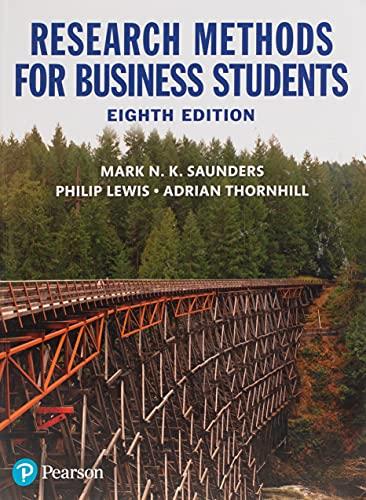George was in his final year of an MSc Marketing degree. He had booked a meeting with his project tutor in the expectation that
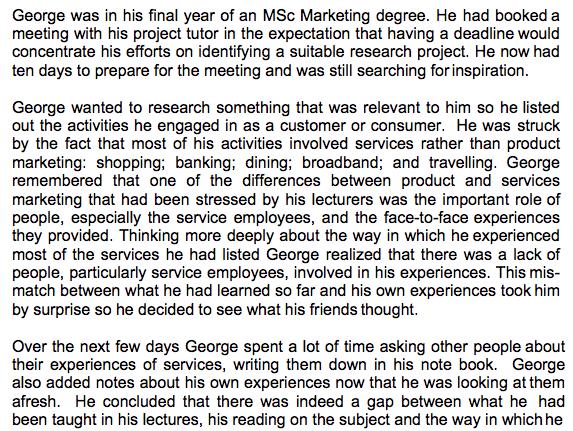
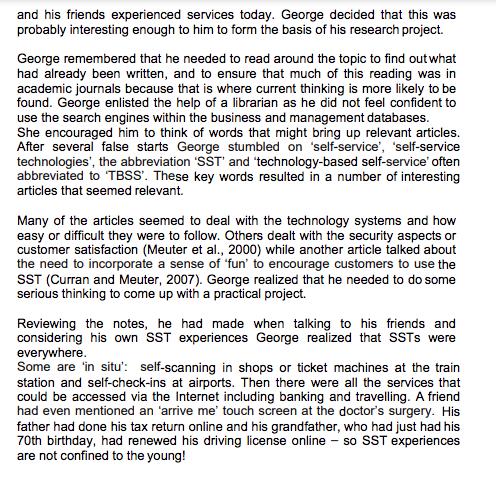
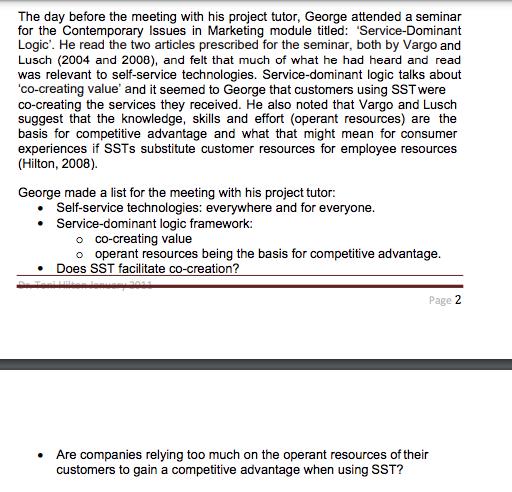
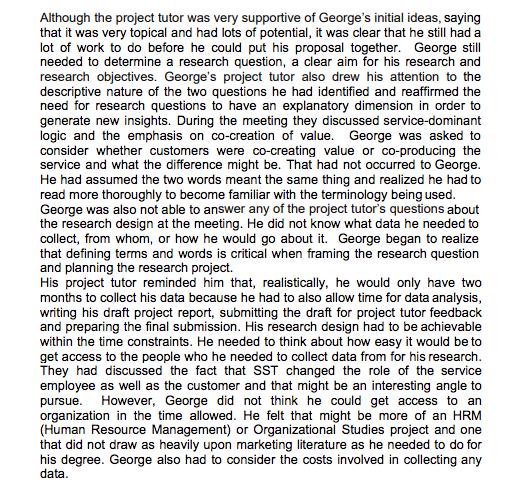
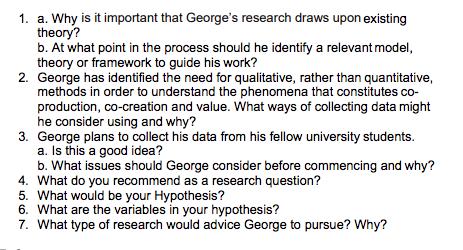
George was in his final year of an MSc Marketing degree. He had booked a meeting with his project tutor in the expectation that having a deadline would concentrate his efforts on identifying a suitable research project. He now had ten days to prepare for the meeting and was still searching for inspiration. George wanted to research something that was relevant to him so he listed out the activities he engaged in as a customer or consumer. He was struck by the fact that most of his activities involved services rather than product marketing: shopping; banking; dining; broadband; and travelling. George remembered that one of the differences between product and services marketing that had been stressed by his lecturers was the important role of people, especially the service employees, and the face-to-face experiences they provided. Thinking more deeply about the way in which he experienced most of the services he had listed George realized that there was a lack of people, particularly service employees, involved in his experiences. This mis- match between what he had learned so far and his own experiences took him by surprise so he decided to see what his friends thought. Over the next few days George spent a lot of time asking other people about their experiences of services, writing them down in his note book. George also added notes about his own experiences now that he was looking at them afresh. He concluded that there was indeed a gap between what he had been taught in his lectures, his reading on the subject and the way in which he and his friends experienced services today. George decided that this was probably interesting enough to him to form the basis of his research project. George remembered that he needed to read around the topic to find out what had already been written, and to ensure that much of this reading was in academic journals because that is where current thinking is more likely to be found. George enlisted the help of a librarian as he did not feel confident to use the search engines within the business and management databases. She encouraged him to think of words that might bring up relevant articles. After several false starts George stumbled on 'self-service', 'self-service technologies', the abbreviation 'SST' and 'technology-based self-service' often abbreviated to TBSS'. These key words resulted in a number of interesting articles that seemed relevant. Many of the articles seemed to deal with the technology systems and how easy or difficult they were to follow. Others dealt with the security aspects or customer satisfaction (Meuter et al., 2000) while another article talked about the need to incorporate a sense of 'fun' to encourage customers to use the SST (Curran and Meuter, 2007). George realized that he needed to do some serious thinking to come up with a practical project. Reviewing the notes, he had made when talking to his friends and considering his own SST experiences George realized that SSTS were everywhere. Some are 'in situ': self-scanning in shops or ticket machines at the train station and self-check-ins at airports. Then there were all the services that could be accessed via the Internet including banking and travelling. A friend had even mentioned an 'arrive me' touch screen at the doctor's surgery. His father had done his tax return online and his grandfather, who had just had his 70th birthday, had renewed his driving license online so SST experiences are not confined to the young! The day before the meeting with his project tutor, George attended a seminar for the Contemporary Issues in Marketing module titled: 'Service-Dominant Logic'. He read the two articles prescribed for the seminar, both by Vargo and Lusch (2004 and 2008), and felt that much of what he had heard and read was relevant to self-service technologies. Service-dominant logic talks about 'co-creating value' and it seemed to George that customers using SST were co-creating the services they received. He also noted that Vargo and Lusch suggest that the knowledge, skills and effort (operant resources) are the basis for competitive advantage and what that might mean for consumer experiences if SSTS substitute customer resources for employee resources (Hilton, 2008). George made a list for the meeting with his project tutor: Self-service technologies: everywhere and for everyone. Service-dominant logic framework: o co-creating value o operant resources being the basis for competitive advantage. Does SST facilitate co-creation? 2014 . Page 2 Are companies relying too much on the operant resources of their customers to gain a competitive advantage when using SST? Although the project tutor was very supportive of George's initial ideas, saying that it was very topical and had lots of potential, it was clear that he still had a lot of work to do before he could put his proposal together. George still needed to determine a research question, a clear aim for his research and research objectives. George's project tutor also drew his attention to the descriptive nature of the two questions he had identified and reaffirmed the need for research questions to have an explanatory dimension in order to generate new insights. During the meeting they discussed service-dominant logic and the emphasis on co-creation of value. George was asked to consider whether customers were co-creating value or co-producing the service and what the difference might be. That had not occurred to George. He had assumed the two words meant the same thing and realized he had to read more thoroughly to become familiar with the terminology being used. George was also not able to answer any of the project tutor's questions about the research design at the meeting. He did not know what data he needed to collect, from whom, or how he would go about it. George began to realize that defining terms and words is critical when framing the research question and planning the research project. His project tutor reminded him that, realistically, he would only have two months to collect his data because he had to also allow time for data analysis, writing his draft project report, submitting the draft for project tutor feedback and preparing the final submission. His research design had to be achievable within the time constraints. He needed to think about how easy it would be to get access to the people who he needed to collect data from for his research. They had discussed the fact that SST changed the role of the service employee as well as the customer and that might be an interesting angle to pursue. However, George did not think he could get access to an organization in the time allowed. He felt that might be more of an HRM (Human Resource Management) or Organizational Studies project and one that did not draw as heavily upon marketing literature as he needed to do for his degree. George also had to consider the costs involved in collecting any data. 1. a. Why is it important that George's research draws upon existing theory? b. At what point in the process should he identify a relevant model, theory or framework to guide his work? 2. George has identified the need for qualitative, rather than quantitative, methods in order to understand the phenomena that constitutes co- production, co-creation and value. What ways of collecting data might he consider using and why? 3. George plans to collect his data from his fellow university students. a. Is this a good idea? b. What issues should George consider before commencing and why? 4. What do you recommend as a research question? 5. What would be your Hypothesis? 6. What are the variables in your hypothesis? 7. What type of research would advice George to pursue? Why?
Step by Step Solution
3.26 Rating (155 Votes )
There are 3 Steps involved in it
Step: 1
SOLUTION 1a It is important for Georges research to draw upon existing theory because it provides a foundation for his work ensures that his research is relevant to the field and helps him to identify ...
See step-by-step solutions with expert insights and AI powered tools for academic success
Step: 2

Step: 3

Ace Your Homework with AI
Get the answers you need in no time with our AI-driven, step-by-step assistance
Get Started


